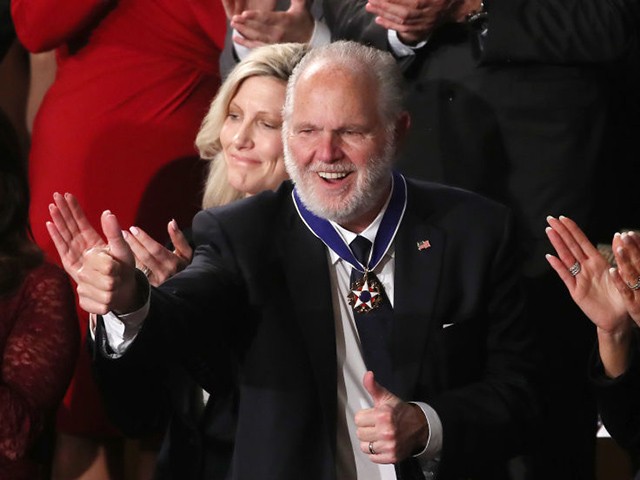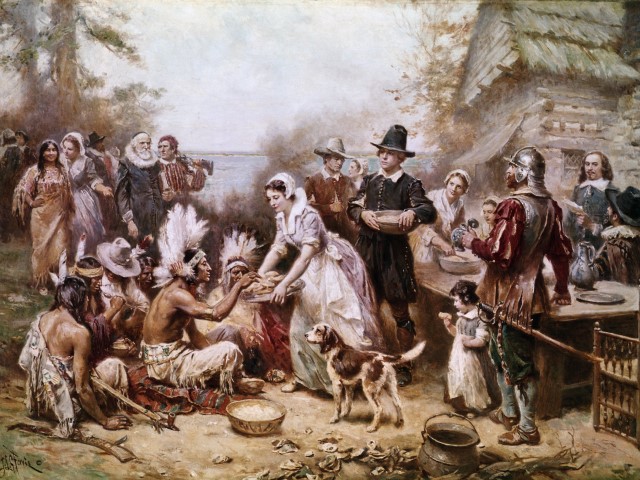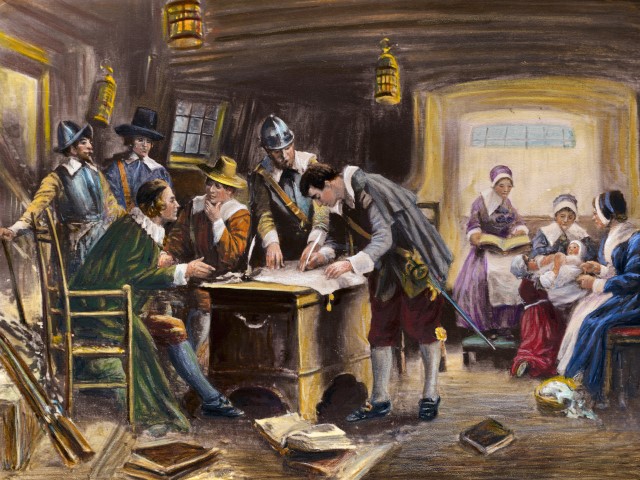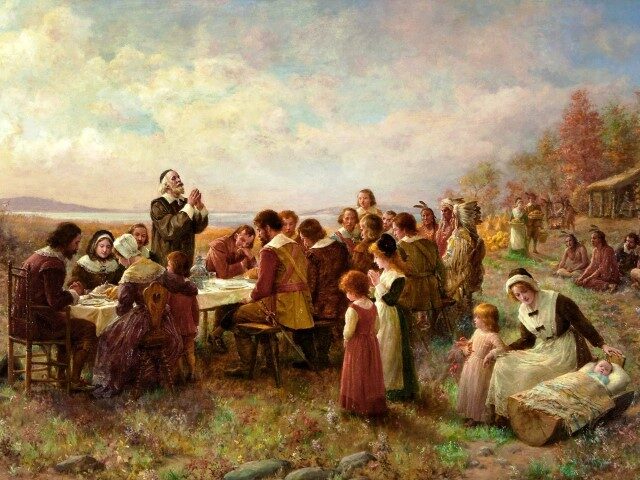This year’s Thanksgiving holiday marks the second year Americans have gone without hearing the late Rush Limbaugh’s annual recount of the “True Story of Thanksgiving,” but the tradition still lives in the hearts of his millions of devoted listeners.
The conservative icon delivered his last Thanksgiving story on November 24, 2020. Nearly three months later, he lost his battle against advanced stage lung cancer at the age of 70.

Radio personality Rush Limbaugh reacts after First Lady Melania Trump gives him the Presidential Medal of Freedom during the State of the Union address in the chamber of the U.S. House of Representatives on February 04, 2020, in Washington, DC. (Mark Wilson/Getty Images)
His Thanksgiving message became an annual tradition over the years. Limbaugh recounted the “True Story of Thanksgiving” in his book See, I Told You So. He also included the true story in his Rush Revere series.
“The point is, The True Story of Thanksgiving is spreading, and I couldn’t be happier about that. Bottom line: It is spreading. I’m just gonna cut to the chase here before getting into reading the text. The Real Story of Thanksgiving, going back to the very first early days of the Pilgrims arriving at Plymouth Rock, is that socialism failed,” Limbaugh said during his final Thanksgiving radio broadcast.
Limbaugh detailed the conditions the Pilgrims faced when they landed in the New World, documented by William Bradford.
“During that first winter — remember, they arrive in November — during that first winter, half of them, including William Bradford’s own wife, died of starvation, of sickness, exposure to the elements. Now we’re getting close to what you were taught in school. When spring finally came — and, by the way, writing that doesn’t do it justice. Spring didn’t just finally come. It was a survival. It was an act of survival that you and I cannot possibly relate to or understand,” he said, explaining that this is where the story usually begins to take a turn in public schools.
“They did meet the Indians, the Native Americans who were there, who did help them in planting corn and fishing for cod. They showed ’em where the beavers were so the beavers could be skinned for coats, other things.
“But even at this, even with this degree of assistance from the Indians, the Native Americans, there wasn’t any prosperity yet. They had the Mayflower Compact. They had these laws they were living by, and there was no prosperity. And I wonder why,” he said.
“Now, this is important to understand here, folks, because this is where modern American history lessons end, with the Indians teaching the Pilgrims how to eat, how to fish, how to skin beavers, and all that,” he continued.
The transcript reads in part:
That’s where it ends. And that’s the feel-good story. But that doesn’t even get close to the true story. You know, Thanksgiving is actually explained in some textbooks as a holiday for which the Pilgrims gave thanks to the Indians for saving their lives. It wasn’t that. That happened, but Thanksgiving was a devout expression of gratitude, the Pilgrims, to God for their survival, and everything that was a part of it.

Painting by J.L.M. Ferris of the first Thanksgiving ceremony with Native Americans and the Pilgrims in 1621. Undated illustration.
Then Limbaugh explains a part that few of us learned at school:
Now, here’s the part that has been omitted. The original contract the Pilgrims entered into in Holland — they had sponsors. They didn’t have the money to do this trip on their own. They had sponsors. There were merchant sponsors in London and in Holland. And these merchant sponsors demanded that everything that the Pilgrims produced in the New World would go into a common store, a single bank, if you will. And that each member of the Pilgrim community was entitled to one share.
So everybody had an equal share of whatever was in that bank. All of the land they cleared, all of the houses they built belonged to that bank, to the community as well. And they were going to distribute it equally, because they were gonna be fair. So all of the land that they cleared and all the houses they built belonged to everybody. Belonged to the community. Belonged to the bank, belonged to the common store. Nobody owned anything. They just had an equal share in it. It was a commune.
The Pilgrims established a commune, essentially. Forerunner of the communes we saw in the sixties and seventies out in California. They even had their own organic vegetables, by the way. Yep. The Pilgrims, forerunners of organic vegetables. Of course, what else could there be? No such thing as processed anything back then.
But William Bradford saw that it wasn’t working, and decided to take “bold action”:
Now, William Bradford, who had become the governor of the colony ’cause he was the leader, recognized that this wasn’t gonna work. This was costly and destructive, and it just wasn’t working. It was collectivism. It was socialism. It wasn’t working. That first winner had taken a lot of lives. The manpower was greatly reduced. So William Bradford decided to take bold action, which I will describe when we get back.
He assigned a plot of land to each family. Every family was given a plot of land. They could work it, manage it however they wanted to. If they just wanted to sit on it, get fat, dumb, happy, and lazy, they could. If they wanted to develop it, if they wanted to grow corn, whatever on it, they could. If they wanted to build on it, they could do that. If they wanted to turn it into a quasi-business, they could do whatever they wanted to do with it.
He turned loose the power of the capitalist marketplace. Long before Karl Marx was even born. Long before Karl Marx was a sperm cell in his father’s dreams, the Pilgrims had discovered and experimented with what could only be described as socialism, and they found that it didn’t work. Now, it wasn’t called that then. But that’s exactly what it was. Everybody was given an equal share. You know what happened? Nobody did anything. There was no incentive. Nothing worked. Nothing happened.

Signing of the Mayflower Compact by Myles Standish, William Bradford, William Brewster and John Carver on board the Mayflower in November 1620. The compact was the first governing document of Plymouth Colony. Illustration from a painting by Edward Percy Moran (1862-1935), circa 1900. (Bettman / Getty)
So Bradford introduced the basic tenets of capitalism, which completely changed the game for the Pilgrims in the New World.
“The success of that colony after they had abandoned socialism and tried what was essentially capitalism, the word spread throughout the Old World of this massive amount of prosperity that was there for the taking in the New World. And guess what happened? The New World was flooded with new arrivals,” he said.
“The lesson is — The True Story of Thanksgiving is — that William Bradford and his Pilgrim community were thanking God for the blessings on their community after the first miserable winter of a documented failure brought on by their attempt at fairness and equality, which was socialism,” Limbaugh added.
LISTEN to the entire segment:

COMMENTS
Please let us know if you're having issues with commenting.